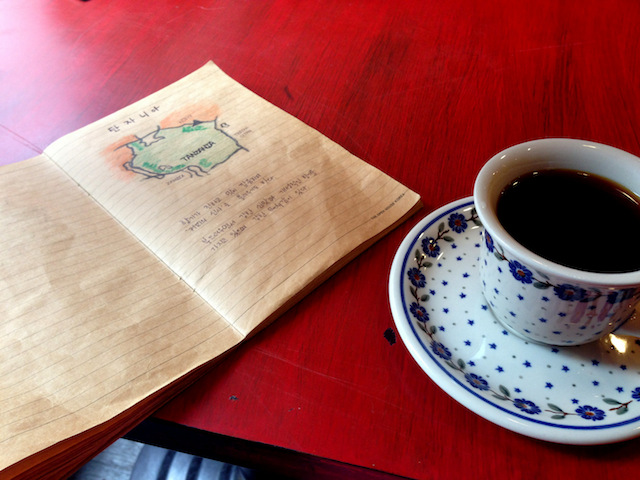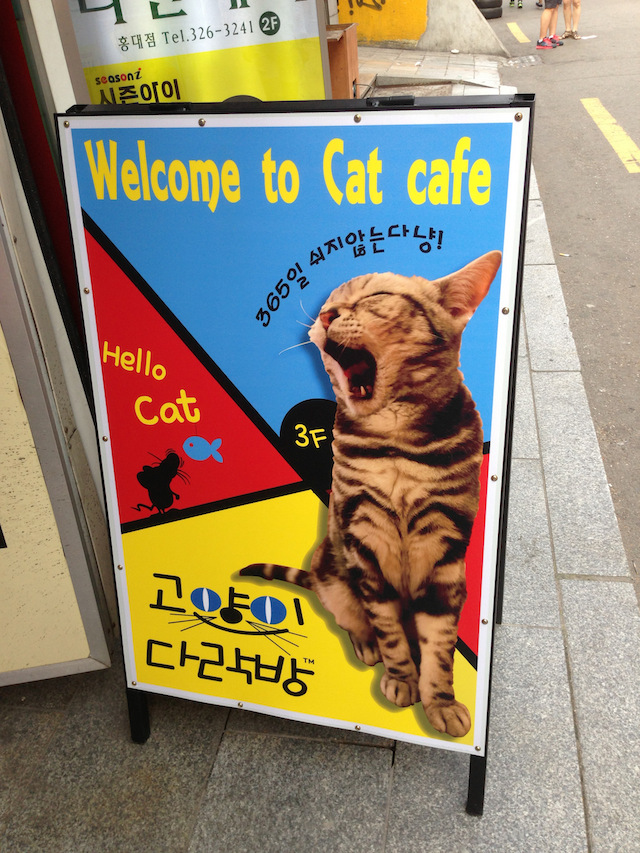
By Ariana Chomitz
If imagining the Far East brings to mind a kingdom of tea, South Korea might catch a jetlagged traveler off guard with its metropolitan mecca of gourmet espresso and coffee. In Seoul, a plethora of tiny, specialty coffee shops abound–certainly more independent cafés per block than seems sustainable. For a coffee-lover, the dizzying choices are a dream.

The diverse décor of Seoul’s café scene ranges from Francophile to anime, from minimalist to bohemian, and monochrome to neon. There is even an entire genre of “cat cafes,” where one can, for a small cover fee, enjoy unlimited drinks in the company of the in-house cats—like renting a pet by the hour. And yet, even in a café-saturated landscape, one setback for this American abroad was that none of them seemed to be open for breakfast. Instead, the cafes conducted business at the odd hours of midday through midnight. The rules for coffee culture in Korea clearly diverged from the expectations I carried with me as an American coffee drinker—I set out to find how.
The way that people drink coffee says much about the social nuances attached to it, indicating distinct cultural values. For example, Americans tend to rely on coffee as a necessary ritual; it’s appropriate to drink coffee first thing in the morning, and we all know someone who claims they can’t function until they’ve had their daily dose. Americans also value efficiency and convenience when it comes to coffee, as seen by its wide availability and cheap cost. You can get coffee anywhere at anytime, whether that means at a gas station at midnight, or at your local chain cafe at dawn. In my home city of Washington DC, Starbucks is on every block, yet quirky and charming cafes like the ones in Seoul are hard to come by.
Korea’s growing coffee market means that coffee drinking isn’t as prevalent a habit as it is in the US. However, the careful attention to quality and aesthetic presentation that I found in Seoul implied a ceremonial quality about coffee. My usual order of “just a regular drip” seemed a strange request when most Koreans prefer to customize their coffee—iced Americanos, cappuccinos, or at least prepared with greater individual attention, as with a siphon or pour over method. Menus profiled the origin and flavors of single-source coffee beans; descriptions of espresso drinks filled pages. If I wanted “regular” coffee, I could find it in refrigerated bottles in the convenience stores. When Koreans go to cafés, they go for crafted drinks.
The lateness of business hours, too, suggests a different role that cafés play in the daily routines of Koreans. In an urban culture where most families live in small spaces and where children live with their parents until marriage, cafes are the ”third place,” or an informal meeting venue between school or work and home. During peak business hours in the evening, the cozy nooks in Seoul’s cafes fill with friends meeting after school and lingering couples. Designed to feel intimate while remaining publicly accessible, cafés become temporary living rooms for hosting and easy socializing.
Perhaps this is the key to such a diverse proliferation of small, independent cafés—instead of functioning as a necessary errand stop or as an impersonal office desk, the niche, themed coffee shops are as plentiful as the preferences of their patrons, who are more like part-time dwellers of these “third places.”
The result? An interesting perspective on a drink we might take for granted, and a playground paradise for coffee aficionados.
Ariana Chomitz is a writer, photographer, and traveler from Washington, DC. She graduated from Kenyon College, where she received a B.A. in Anthropology and experimented with her passion for digital storytelling in both academic research and personal expression. A strong proponent of experiential education, Ariana spent her gap year in India, studied abroad in Indonesia and Brazil, and currently works for a high school study abroad organization as a program leader and social media creator. She believes that travel should challenge, that art should delight and inform, that people will surprise you, and that bubble baths should cap off the best and the worst days.
